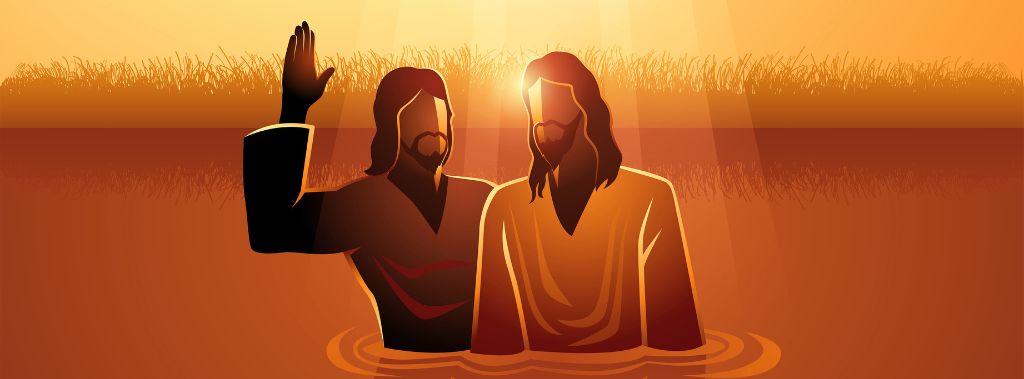The Promised Land: Transition in the Jordan River
An incredible number of Believers around the world are aware of the Jordan River… but why is that? Is the Jordan River important beyond Yeshua’s immersion? Is there a history of God using the Jordan River?
Join us as we explore many of the wonderful transitions that happened in the Jordan River!
The Jordan River
The Jordan, or Yarden as it is known in Israel, is perhaps the most famous and important river found in the Old and New Testaments.
Approximately 156 miles in length, the Jordan River is located in the Promised Land; today serving as a border between Israel and Jordan. Uniquely, this one river feeds not only the Sea of Galilee, but flows through it and on into the Dead Sea—a virtually lifeless body of salt water situated at the lowest point in the world.
That the fresh water of the Galilee and the salt of the Dead Sea could be connected AND fed by one river is astounding in the natural. But spiritually, it has an even deeper meaning. For the Jordan River connects the dead to life in spiritual ways as well…
For instance, the children of Israel crossing the Jordan River to enter the Promised Land brought new life; Elijah and Elisha went to the Jordan to transfer the old to the new; and Jesus—Yeshua—was immersed into His new season to bring us eternal life and relationship!
Given just these few examples, we see that the Jordan River is a place chosen by God for amazing transitions!
The Jordan River from Jacob to Elisha
In the book of Genesis, we read that Jacob wrestles with God by the ford of Jabbok—a place he renamed Peniel or Penuel—which flows into the Jordan River. This is the first direct mention of the area we know as the Jordan and as a result, it provides a very early connection to the Jordan River. Accordingly, Jacob is also one of the first people recorded in the Word—besides possibly Lot—to have been in the land of Jordan and known those waters.
“So Jacob called the name of the place Peniel: ‘For I have seen God face to face, and my life is preserved.’ Just as he crossed over Penuel the sun rose on him, and he limped on his hip.”
—Genesis 32:30-31
This early connection to the elders of the Word and people of Israel is special, however the Jordan River would continue to play an important role in many biblical accounts. The next of which would involve coming to the Promised Land…
“But I must die in this land, I must not cross over the Jordan; but you shall cross over and possess that good land.”
—Deuteronomy 4:22
Moses and Aaron, along with a generation of those who fell into fear, doubt, and unbelief, sadly did not cross over the Jordan River, but in God’s love and mercy, the generation to follow, led by Joshua, would. At the time of the crossing, the Ark of the Covenant went before the people, leaving dry land for them to cross, and on that dry land twelve stones were placed. One stone for each of the tribes of Israel.
“…the children of Israel… took up twelve stones from the midst of the Jordan, as the Lord had spoken to Joshua, according to the number of the tribes of the children of Israel, and carried them over with them to the place where they lodged, and laid them down there. Then Joshua set up twelve stones in the midst of the Jordan, in the place where the feet of the priests who bore the ark of the covenant stood; and they are there to this day.”
—Joshua 4:8-9
These twelve stones and this specific section of the Jordan River would perform an important role many generations later when Jesus went to be immersed in the Jordan River; yet even before that time, the river continued to play its part in the history of the Word…
The half-tribe of Manasseh, the tribe of Reuben, and the tribe of Gad—though sending armed men across the Jordan River to help the other tribes take the land—remained in the edges of the Promised Land; the east side of the Jordan River. As a result, for these tribes to go to the Tabernacle for God’s appointed times and for certain events, they would have had to cross the Jordan River.
Further still, many enemies would also have to cross the Jordan River to reach God’s children.
“Moreover the people of Ammon crossed over the Jordan to fight against Judah also, against Benjamin, and against the house of Ephraim, so that Israel was severely distressed.”
—Judges 10:9
The river was a source of life for Israel, as well as a barrier to be crossed for many of their enemies… but it was also a sign of the changing of spiritual seasons. Such as when the generation of Moses was not allowed to cross over, but the generation of Joshua was. It was a place of Godly transition that saw incredible shifts… and not just during the lifetimes of Moses or Joshua, but in those to come.
Take, for instance, Elijah and Elisha. When Elijah knew that God was ready for him to leave Earth for Heaven, he and Elisha began to journey to the Jordan River. At first Elijah tried to encourage Elisha to stay behind, but soon they continued on to the Jordan River… where Elijah ascended to Heaven, leaving behind his mantle and a double portion for Elisha.
“Then Elijah said to him, ‘Stay here, please, for the Lord has sent me on to the Jordan.’
“But he said, ‘As the Lord lives, and as your soul lives, I will not leave you!’ So the two of them went on… Now Elijah took his mantle, rolled it up, and struck the water; and it was divided… so that the two of them crossed over on dry ground.
“And… Elijah said to Elisha, ‘Ask! What may I do for you, before I am taken away from you?’
“…‘Please let a double portion of your spirit be upon me.’
“So he said, ‘You have asked a hard thing. Nevertheless, if you see me when I am taken from you, it shall be so for you…’ Then it happened, as they continued on and talked, that suddenly a chariot of fire appeared with horses of fire, and separated the two… and Elijah went up by a whirlwind into heaven.
“…Elisha saw it, and… cried out, ‘My father, my father, the chariot of Israel and its horsemen!’ So he… took up the mantle of Elijah that had fallen from him, and went… by the bank of the Jordan. Then he took the mantle of Elijah… struck the water, and said, ‘Where is the Lord God of Elijah?’ And when he… struck the water, it was divided… and Elisha crossed over.”
—2 Kings 2:6-14
Jesus at the Jordan River
The transitions that took place at the Jordan River all played a part in why Jesus chose to be immersed in those waters… why He did not go elsewhere. And why Father God arranged for the immersion to occur in the same place where the tribes of Israel once crossed into the Promised Land; setting twelve stones in place.
Because it was in that river that there was a pattern of death and life being exchanged, of purposes being set in motion, and seasons shifting.
“To everything there is a season, a time for every purpose under heaven.”
—Ecclesiastes 3:1

Thus, Yeshua went to the Jordan to be immersed by John the Baptist (known to his contemporaries as Yochanan the Immerser). Jesus traveled through a dangerous area—essentially the Valley of the Shadow of Death—and went to the very place where the Israelites crossed over into their promise… their new season, purpose, and life. He went to the twelve stones. The foundation.
This place was not chosen by chance. Jesus did not go there simply because John was there—though there are numerous reasons why He chose to be immersed by John specifically. Yeshua went because it was a place of transition. And it was time. He had to be immersed into His calling. He was 30 years old; He was ready to take up His mantle as Rabbi; and in God’s Law, He had to be immersed. Further still, because of who Jesus was and is, He had to be immersed by the High Priest.
Now, John was not the High Priest in the eyes of those in power, because they had sold the position. However, John was legally—in God’s eyes and ordinances—the High Priest.
John was of the lineage of the priesthood. Jesus knew this—as did those who went to John to be immersed—not only because He was the cousin of John, but because God guided Him. God led Him to John, and despite John’s hesitancy, Yeshua did as God willed and was immersed at that place, at that time, and by John.
“Then Yeshua came from the Galil to the Yarden to be immersed by Yochanan. But Yochanan tried to stop him. ‘You are coming to me? I ought to be immersed by you!’ However, Yeshua answered him, ‘Let it be this way now, because we should do everything righteousness requires.’ Then Yochanan let him.
“As soon as Yeshua had been immersed, he came up out of the water. At that moment heaven was opened, he saw the Spirit of God coming down upon him like a dove, and a voice from heaven said, ‘This is my Son, whom I love; I am well pleased with him.”
—Matthew 3:13-17 (CJB)
Jesus knew the importance of doing all God spoke in His Word. He studied the Word with due diligence to become a Rabbi. He was and is the Son of God and would ONLY do what God the Father did and required.
Takeaway
The Jordan River is a place of transition…
A place of turning the dead to life, old seasons to new, and giving fresh purpose!
For us as Believers, it is easy to remember the Jordan River only in connection with Jesus’ immersion, yet, the happenings in the Old Testament laid the foundation… displaying the consistency and design of God.
We can see it in Jacob’s place of meeting with God. In God’s children crossing over to the land He promised—changing the season for His people—putting in place a foundation and pattern for Jesus to follow; because God laid it.
God ordained the stones to be set in the river. God led Elijah to cross the Jordan before he ascended to Heaven. Nothing God did or does is by chance. The connection between death and life, the transitions that took place there, they are all a part of God’s grand design.
Though many people may never physically see or touch the waters of the Jordan, God has given us so much that can be learned from it. There are still patterns that apply to our lives today; transitions that we can come to understand.
We are reminded that in life there are seasons ordained by God. That things move in a cycle, progressing forward, and that we—each in our own lives—have times where we must cross over. Elisha would not have received a double portion had he not crossed over. The children of Israel would not have received their promise.
And we too must trust our Father and cross our own river to transition into the life He has called us to live!
We must follow the patterns of God.
